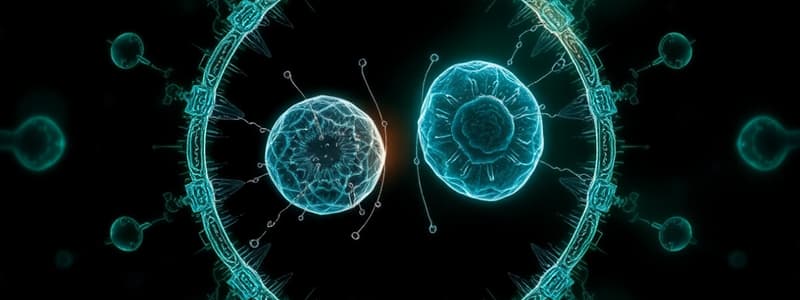Podcast
Questions and Answers
What is the primary function of the centromere in a chromosome?
What is the primary function of the centromere in a chromosome?
- To attach sister chromatids together. (correct)
- To synthesize proteins for cell division.
- To protect the ends of the chromosome.
- To initiate DNA replication.
During which phase of the cell cycle is DNA replicated?
During which phase of the cell cycle is DNA replicated?
- M phase
- S phase (correct)
- G2 phase
- G1 phase
Which of the following best describes the relationship between chromosomes and chromatin?
Which of the following best describes the relationship between chromosomes and chromatin?
- Chromosomes are made by condensing chromatin. (correct)
- Chromatin is composed of multiple chromosomes.
- Chromatin and chromosomes are not related
- Chromosomes replicate chromatin during interphase.
What is the correct order of the phases of mitosis?
What is the correct order of the phases of mitosis?
What is the outcome of mitosis?
What is the outcome of mitosis?
Which of the following occurs during the G2 phase of the cell cycle?
Which of the following occurs during the G2 phase of the cell cycle?
Where does mitosis occur?
Where does mitosis occur?
What is the purpose of the cell cycle?
What is the purpose of the cell cycle?
Flashcards
Cell Division in Eukaryotes
Cell Division in Eukaryotes
Cell division in eukaryotes occurs in two main stages: mitosis (nuclear division) and cytokinesis (cytoplasmic division).
Mitosis
Mitosis
Mitosis is a process of nuclear division that produces two identical daughter cells, each with the same number of chromosomes as the parent cell.
Chromosomes
Chromosomes
Chromosomes are thread-like structures made of DNA and protein that carry genetic information. During cell division, each chromosome duplicates into two identical sister chromatids joined at the centromere.
Chromatin
Chromatin
Signup and view all the flashcards
Cell Cycle
Cell Cycle
Signup and view all the flashcards
Interphase
Interphase
Signup and view all the flashcards
Phases of Mitosis
Phases of Mitosis
Signup and view all the flashcards
Cytokinesis
Cytokinesis
Signup and view all the flashcards
Study Notes
Cell Division in Eukaryotes
- Eukaryotic cell division comprises mitosis (nucleus division) and cytokinesis (cytoplasm division).
- Mitosis produces two genetically identical daughter cells with the same chromosome number as the parent cell.
Chromosomes
- Each chromosome is composed of two identical sister chromatids.
- Chromatids are attached at the centromere.
- Chromosomes carry genetic information passed between generations.
- Before cell division, chromosomes duplicate.
- Chromatin are long thin strands of DNA and protein, holding DNA together during chromosome formation.
The Cell Cycle
- The cell cycle describes the series of events cells undergo to grow and divide, forming daughter cells.
- Stages include growth, preparation for division, and division into two daughter cells, restarting the cycle.
- Interphase is the growth period between cell divisions. Cells spend most of their lifetime in interphase.
Interphase subphases
- G1 (First Gap Phase): Cell growth, protein and organelle synthesis.
- S (DNA Replication Phase): Chromosome replication; DNA synthesis occurs.
- G2 (Second Gap Phase): Production of organelles and molecules required for cell division; prepares cell for mitosis (M phase).
Mitosis
- Mitosis occurs in somatic (body) cells.
- It produces two identical daughter cells.
- The process is organized into four phases: Prophase, Metaphase, Anaphase, Telophase (PMAT).
Mitosis Phases
- Prophase: The first phase of mitosis.
- Metaphase: The second phase of mitosis.
- Anaphase: The third phase of mitosis.
- Telophase: The final phase of mitosis.
Studying That Suits You
Use AI to generate personalized quizzes and flashcards to suit your learning preferences.




